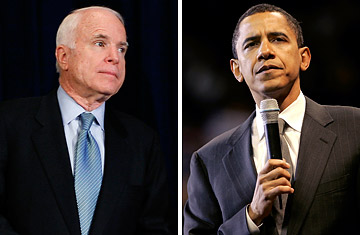
John McCain, left, and Barack Obama.
Backed by a more diverse coalition of voters than he has previously attracted, Barack Obama swept to impressive victories in Virginia, Maryland and the District of Columbia Tuesday night, jumping to a lead in the overall delegate tally for the first time since Iowa and making the odds of a comeback by Hillary Clinton, while hardly impossible, decidedly longer.
While Obama rung up 30-point margins over Clinton, Republican John McCain swept the Potomac Primaries with narrower wins over Mike Huckabee, a reminder that the Republican base remains unsettled over the prospect of the party's presumptive nominee.
What made the night historic was not so much the margins of Obama's wins — though those were impressive — but the scope and depth of his winning coalition. According to exit poll data, Obama prevailed in Virginia among white males, independents and young voters. In Maryland, he bested Clinton among rural voters, union households and catholic voters. Everywhere, as expected, he won huge margins of African-American voters who turned out to vote in numbers far in excess of their proportion of the population. In Maryland, African Americans are 29% of the population but formed 37% of the electorate, while in Virginia the numbers are 20 and 29.
The results also show the ways in which Obama is exerting a huge gravitational pull on both races. Obama is drawing so many moderates and independents to the Democratic race from what would normally be the ranks of the Republican electorate that 1) he's rolling up large margins and stitching together a broader coalition, and 2) he's making the Republican electorate comparatively smaller, and more conservative. Exit polls noted that one half of Virginia's voters were evangelicals; one third were self-described as "very conservative" while only a quarter were independents. As a result, Mike Huckabee was able to take 41% of the state's Republican vote.
Turnout, meanwhile, was up everywhere, just as it has been all along in the 2008 sweepstakes. More than 850,000 Virginians voted in that state's Democratic primary — more than twice the number that voted in the state's 2004 contest.
Before the evening was out, Obama was leading Clinton in pledged delegates for the first time since Iowa and with a few weeks to go before she is likely to place ahead of him in a single primary. While Obama is not impossible to catch, Clinton must rack up outsized victories in Ohio, Texas and Pennsylvania to do it — states where the margins of victory are more likely to be in single digits, though for whom is anyone's guess at this stage.
But it helps explain why Clinton had decamped to El Paso, Texas, before all the results were in. She has to shore up what she hopes will be a Lone Star–sized firewall before the state's March 4 primary. Obama, meanwhile, could be found in Wisconsin, where the next big contest, and his next big opportunity, comes Feb. 19.
